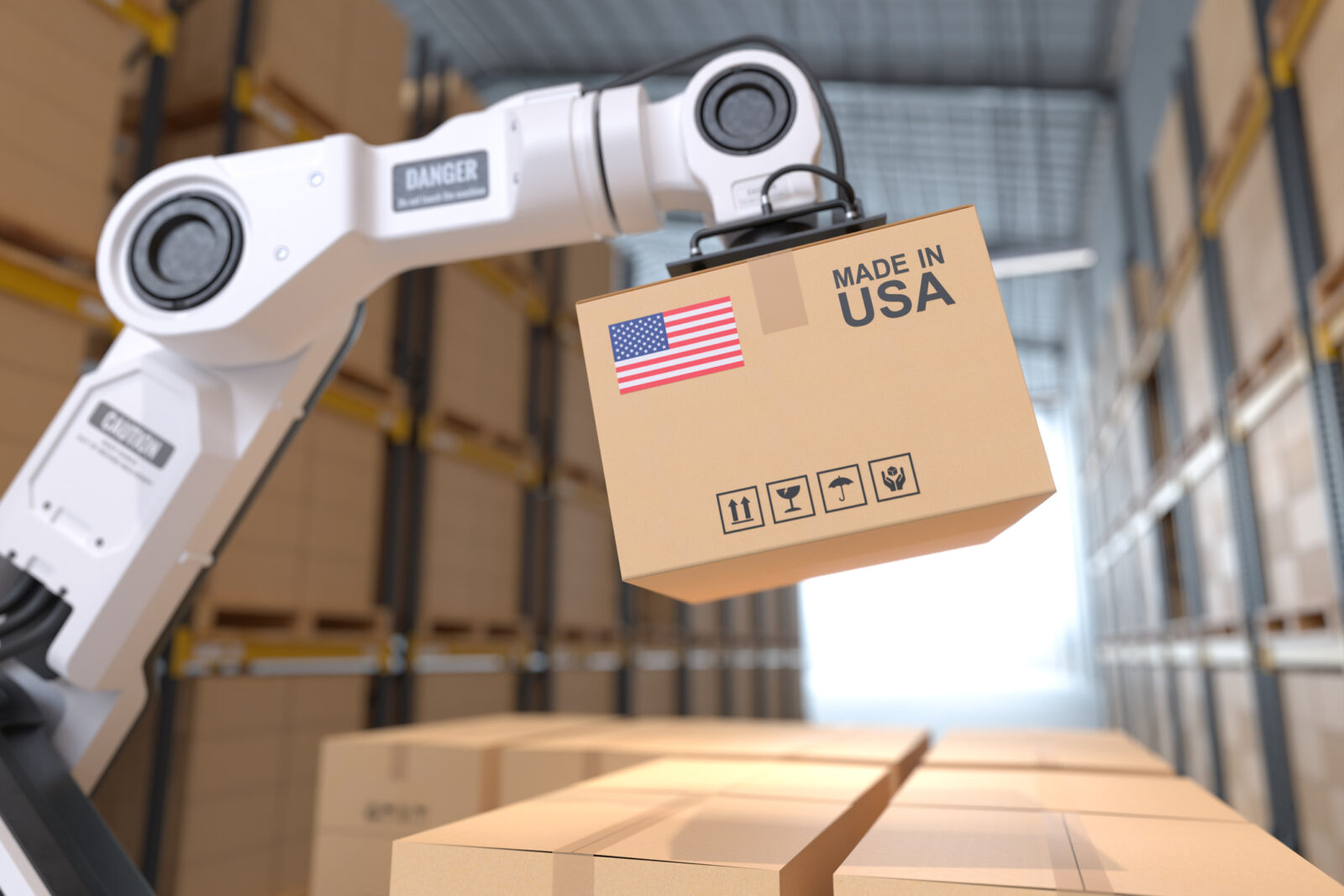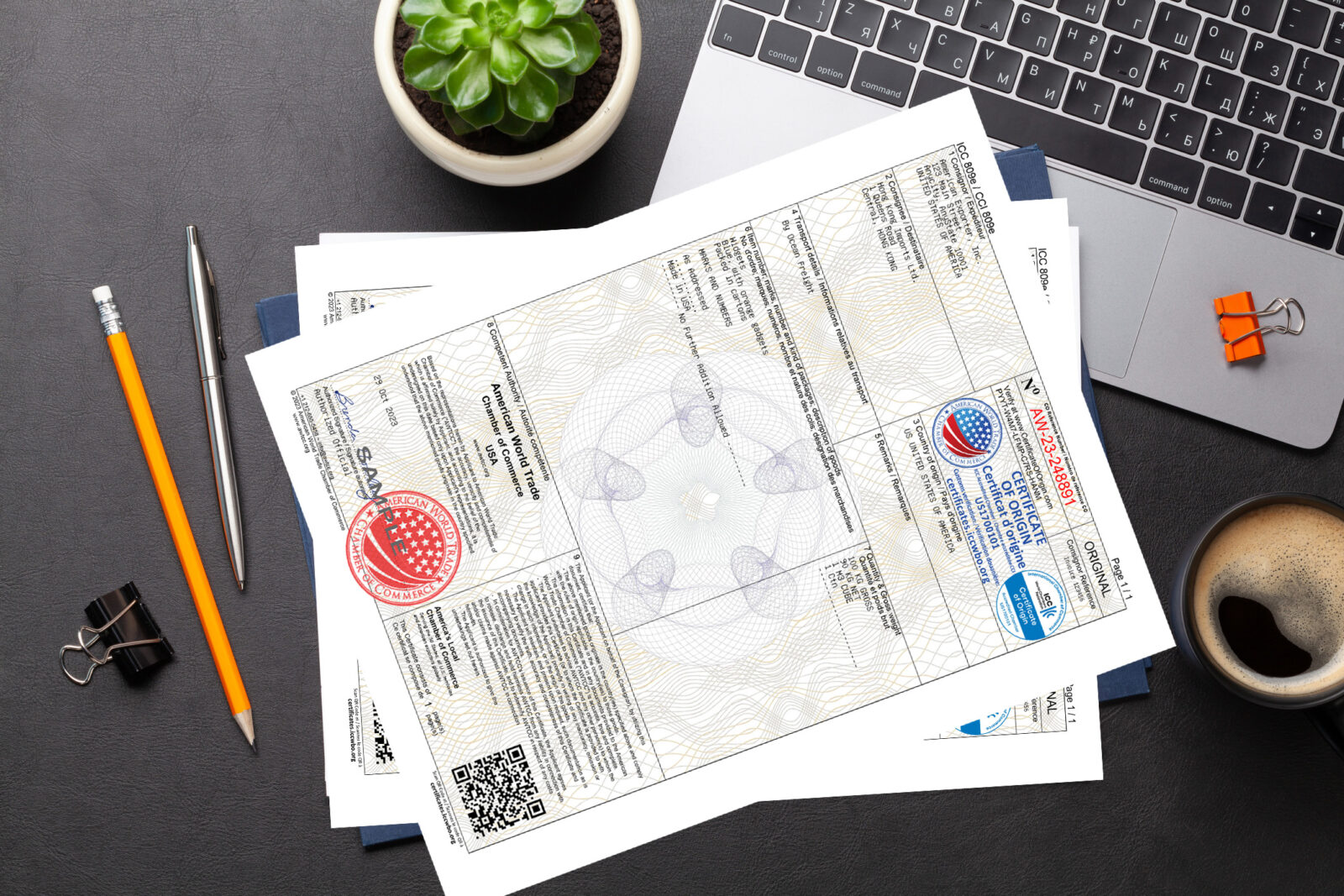Certificates of Origin
Made in USA – or elsewhere – if you need a CO, you’re in the right place

Did you know?
Much of Europe and the Asia-Pacific region have been digitally issuing export-related Certificates of Origin for decades, and the issuance of electronic COs (eCOs) in China is extremely common. One of the goals of the American World Trade Chamber of Commerce (AWTCC) is to bring greater awareness of electronic export services to the United States, which has one of the lowest levels of digital documentation for export in the industrialized world. By engaging further with digital documentation, U.S. exporters can find their operations streamlined and their service to foreign buyers improved.
If you need an electronic Certificate of Origin to export products made in the USA or somewhere else, you have come to the right place. Our eCOs can be electronically verified by Customs authorities worldwide through our accreditation by the International Chamber of Commerce. You can apply by registering for our Online Certification System. Registration is complimentary; you only pay for the certificates you issue.
Learn more about this specialized export compliance document and why it’s important.
Certificate of Origin Overview for U.S. based Exporters
A Certificate of Origin (CO) for export is a document that certifies the country where goods or products originate. A Certificate of Origin is a vital international trade document. It gives Customs officials the information they need to determine if goods can be imported and what duties apply. Many countries require Chambers of Commerce to authenticate COs. Exporters and Chambers must ensure that these certificates are accurate and comply with the relevant international rules.
Purpose and Legal Requirements
Used for various purposes in international trade compliance, including:
- To satisfy Customs requirements in the importing country.
- To comply with quota regulations and determine the amount of duty to pay.
- To benefit from bilateral or multi-lateral trade agreements, as goods may qualify for a tariff reduction or exemption if they originate from certain countries.
- To meet the requirements of Letters of Credit.
Companies consider Certificates of Origin an important part of meeting overseas Customs requirements.
Exporters need to ensure that they understand the requirements of the destination country and relevant international rules when preparing their Application. The AWTCC is familiar with the international guidelines, as well as the rules of origin, including substantial transformation. You should consult with your overseas buyer to understand the specific requirements of their industry and country. Not complying can lead to Customs delaying goods, imposing additional duties, or denying entry altogether.
CO Types
- Preferential Certificates or Declarations of Origin relate to exports that fall under Free Trade Agreements between countries or groups of countries, which have special reduced (or zero) rates of duty on trade between the nations. Some Free Trade Agreements, especially in which the United States participates, allow an exporter to make a specific Declaration of Origin on their invoice, rather than a separate certificate.
- Exporters use Non-preferential Certificates of Origin for goods they are not exporting to countries that have Free Trade Agreements with the exporting country. They certify the country of origin for purposes of general importation into the destination country.
Chambers of Commerce have the qualifications to issue non-preferential COs, while exporters typically claim origin under Free Trade Agreements through declarations. Chambers must comply with guidelines and best practices under ICC Publication 809e. AWTCC has extensive experience, ICC Accreditation, and staff certified by training from the ICC in Paris.
Role of the International Chamber of Commerce in eCOs
The ICC, spanning over 170 countries and best known for its International Court of Arbitration in Paris and Incoterms, publishes international trade rules and guidelines followed globally, including the rules for Certificates of Origin. In addition, the ICC maintains the verification site used widely by Customs authorities, banks, and others involved in international trade compliance. The AWTCC participates in the ICC verification system, which means our issued eCOs can be easily verified online at the official site.
Determining the country of origin
For non-preferential origin, the basic guidelines for determining the origin of goods relate to whether goods were manufactured (industrial and consumer products) or produced (grown, mined, raised on a farm or ranch, fished from the sea). Goods that were produced generally have a straightforward country of origin (i.e. cattle raised in Texas, nuts grown in California, coal mined in Pennsylvania, etc.). Place of packaging does not convey origin; for example, broccoli grown in Mexico but packaged in Texas is of Mexican – not U.S. – origin. Goods that have been produced, however, are assigned a new country of origin by virtue of a complete transformation – for example, flour from Argentina, butter from Ireland, and sugar from Mexico can be baked into a cake in the U.S. – the cake now originates in the United States.
The origin of manufactured goods, however, can sometimes be a bit more tricky. The general concept is not dissimilar to our cake example above – that is, several parts may have come from a number of different countries, and assembled into, say a machine that is nothing like (and has a different tariff heading) the underlying parts.
Whether manufactured or produced, a process that changes the nature of underlying components means that there is now a “new or different article of commerce” as the International Trade Administration of the U.S. Department of Commerce puts it.
The underlying principle of origin
The principle followed here is known as substantial transformation. Substantial transformation means that the good(s) underwent a fundamental change (normally as a result of processing or manufacturing in the country claiming origin) in form, appearance, nature, or character, which adds to its value an amount or percentage that is significant in comparison to the value which the good(s) (or its components or materials) had when exported from the country in which it was first made or grown. Usually, a new article of commerce – normally one with a different name – is found to result from any process that Customs decides has brought about a “substantial transformation” in the pre-existing components.
What are examples of circumstances that do not impact origin?
Things that do not impact the country of origin are the address of the exporter or the point of origin of the shipment. For example, an exporter may have an address in Ohio, but their factory or supplier is in Mexico. Goods sold by the exporter originate in Mexico, even though the company’s address is in Ohio. Likewise, a company with an address in Illinois has a factory or supplier in Canada – but the goods are shipped from Seattle, Washington. Those goods did not originate in the U.S. just because they were shipped from a point of origin in Washington State by a company with an Illinois address – they are in fact Canadian origin, having been manufactured in Canada.
Because your company address does not indicate the origin of goods, it is important for the invoices you generate for export to include an origin statement – such as “Origin: USA”, or “Made in China”, etc. as appropriate (your shipment may have products originating in more than one country). Customs officials often check to see that the country of origin shown on your Certificate of Origin matches what is shown on your invoice.
Electronic Certificates of Origin
Issuing thousands online every month, the AWTCC is one of the world’s leading issuers of electronic Certificates of Origin. Our certificates display the ICC Accreditation logo and can be verified electronically by Customs authorities, which means exporters are providing their overseas buyers with a safe and secure document. Our easy-to-use online system makes the process of obtaining an eCO efficient, and our official online verification and other security measures mean they are less susceptible to fraud.
Fight international Customs fraud
Fraudulent COs are fairly common, but with the increased security of the digital technology behind AWTCC’s Online Certificates of Origin and ICC Verification, the risk of fraud is nearly eliminated. Help prevent an overseas buyer from diverting your goods in contravention of U.S. Government regulations. We are accredited by the International Chamber of Commerce and participate in the ICC Online Verification System for Customs Authorities, banks, and other relevant parties.
Register for our Online Certification System
If you’re ready to simplify your export paperwork, improve export compliance, and enhance your digital documentation for export, we invite you to register for our Online Certification System today. Registration is complimentary, simply pay as you use. While you don’t need to be a Chamber member to use our services, when you register we will send you information about the benefits and costs of joining, which is something we hope you consider.
Schedule online meeting to discuss Certificates of Origin
Online Certification System Account
Please note that you have to register your company with us before you are able to
start processing documents. There is never a fee to register or receive a login.
